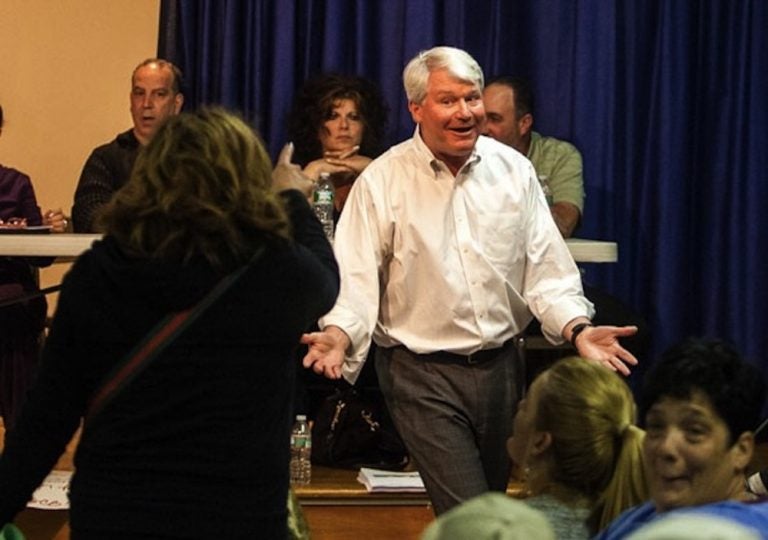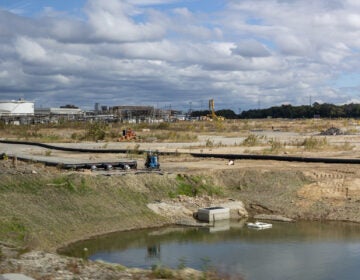Union leader, administration officials blast construction tax
Senior Kenney administration officials and powerful union leader John Dougherty were emphatic Wednesday about their opposition to a proposed 1 percent tax on construction.

Union leader John Dougherty (Brad Larrison for WHYY)
Senior officials in the Kenney administration and powerful union leader John Dougherty were emphatic Wednesday about their opposition to a proposed 1 percent tax on construction, being considered in a City Council committee, whose proceeds would help underwrite affordable housing.
“The ill-conceived tax would have the net effect of ending the recent, prosperous run of new construction that is transforming neglected sections of the city,” wrote Dougherty, also known as “Johnny Doc,” who is business manager for Electricians Union Local 98.
“It makes zero sense,” Dougherty said. The letter was issued on behalf of the Philadelphia Building Trades and Construction Trades Council, which speaks for most of the city’s building trades unions.
Although the building trades unions have been quietly lobbying against the construction tax since it was introduced, Dougherty’s Wednesday letter made their opposition quite clear. The letter circulated as council members took a lunch break from Wednesday’s hearing, which was already in its fourth hour even before testimony was taken on the construction-tax proposal.
The letter did not solely focus on the construction tax, however. Dougherty also attacked council members over their recent clashes with the building trades over minority-hiring provisions in city projects. Amendments expected to be adopted by the committee include a provision giving a 25 percent construction-tax rebate to developers who promise to hire minority workers.
“What we find so ironic is that the Building Trades receives very few hiring recommendations for kids of color from City Council,” wrote Dougherty. “In fact, the requests from Council members for us to host fundraisers for them or make campaign contributions to them outnumber recommendations of qualified minority kids by a margin of 50 to 1.”
Council President Darrell Clarke’s office refused to comment on the letter. Council members appeared stunned by the missive. “I would talk to the trades about that, but I don’t want to comment on it,” said Councilman Mark Squilla, a co-sponsor of the construction tax. “That’s a very strong letter.”
But some at least said it was spine-stiffening.
“This letter helped secure votes for the construction tax,” said one council official, who would only speak on condition of anonymity. “There were a couple of people who were iffy, but don’t like to be bullied.”
In the wide-ranging letter, Dougherty went on to say that the building trades unions were not opposed to reforming or eliminating the 10-year property-tax abatement. He said his union has hired the research firm Econsult to examine every abated property over the past five years to ensure they were keeping up with their permits, taxes, licenses, and permits.
Earlier in the day, a bill introduced by Councilwoman Helen Gym that would have effectively halved the abatement was put on hold, meaning that reform will not be pursued until the fall session.
Thus far, the Kenney administration has not taken a visible stance on the construction-tax proposal, but both Commissioner of Licenses and Inspections David Perri and Commerce Commissioner Harold Epps plan to offer critiques of the legislation.
“While we agree that we must ensure the continued availability of affordable housing, we are very concerned there will be unintended consequences to this legislation,” Epps wrote in prepared testimony. “This type of legislation hampers the business environment, works at odds with our business- attraction efforts, and makes it more difficult to grow jobs in Philadelphia.”
Perri’s line of criticism was more technical, questioning the means by which the tax would be collected.
As currently proposed, the amount of tax that must be paid on a project would be determined by the “total value of construction” estimated in the building permit. But in written testimony Perri is prepared to deliver later in the day, he said that mechanism is “highly subjective and impossible to verify.”
“Almost 20 years ago, the Department of Licenses and Inspections moved away from calculating building-alteration permit fees based upon estimated values of construction due to reporting inconsistencies and disputes,” he wrote.
Perri also argued that the Revenue Department does not have the resources “to review the more than 22,000 building permits that are processed each year.”
At the conclusion of the hearing, council members are expected to adopt amendments PlanPhilly outlined Tuesday including exemptions for renovation jobs under $100,000, a move that secured the support of many landlord groups.
But in an email obtained by PlanPhilly, Richard Feder of the city’s Law Department warned that the proposed change to the bill was illegal.
“The $100,000 exemption is flatly unconstitutional as violative of uniformity,” wrote Feder. “If it stays in the bill, it will definitely lead to litigation.”
Council sources said the amendments are being altered as a result of the Law Department’s concerns.
WHYY is your source for fact-based, in-depth journalism and information. As a nonprofit organization, we rely on financial support from readers like you. Please give today.







